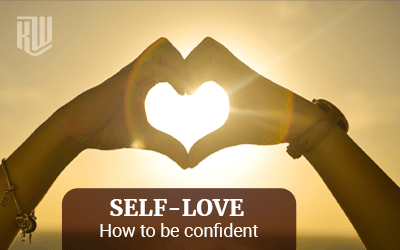Self-love and confidence are essential things. However, the information in this article is a little different from what you usually get when it comes to developing self-love and how to be confident.
Of course, the usual advice still applies: how you hold yourself – your posture and eye contact – influences how people perceive you; if you’re always looking at the ground, you’re not quite telling the world that you love yourself or have much confidence. Similarly, visualizing and feeling your success and thinking positively are good qualities to help you gain confidence. Do your affirmations, be grateful, and be aware of limiting yourself through words and taking action. These are all excellent and legitimate things to do to help you gain confidence and improve your self-love. But there’s more to be done.
Self-love requires two things:
- Self-esteem: self-esteem is the belief that no matter what – whether you have a promising career, whether you have money, whether you have a trophy spouse, great kids, or some other trappings of success – you instinctively and inherently have worth. Just the fact that you are born makes you worthy. You don’t have to be or do or accomplish anything for this to be true.
- Confidence: confidence entails belief in yourself that you can achieve the things you want in the aspects of life we can control. We recognize when we put our mind to it, and as long as we stick to it, we know that we’ll get it.
When you put self-esteem and confidence together, you get self-love. So to love ourselves, we need to have both.
What stops people from achieving self-love?
With incredibly low self-esteem comes massive denial. We don’t want to admit that we feel bad about ourselves, that we can’t see our inherent worth, that we don’t really believe in ourselves, that we lack the confidence to achieve what we want. So we mask it all with drugs or pills or careers – all these different things that help us present an image of ourselves. It’s a band-aid to hide the absence of our self-esteem.
What’s at heart here? What’s the real problem? Where did we learn that we had no inherent worth? It’s not an innate characteristic of the human species. We learn to have low self-esteem and low worth in our childhood.
A lot of people think this is blaming parents, but it’s not. It’s an explanation. We are perfectly imperfect. Even if we went to school all day, every day, to learn how to be a parent, we would still make mistakes because we are human, and it’s an overwhelming job. Think about it. Someone has to work, take care of kids, manage themselves, manage their marriage or partnership, manage technology, manage how other people drive and think, navigate politics and emotions. There’s just so much going on in life. How could parents not make mistakes?
Our low self-esteem is derived from these mistakes. And although we don’t want to admit it to ourselves, that’s what’s killing everybody – denial. We don’t want to accept that we have low self-esteem from less than perfect childhood experiences and how we are in denial of that truth. Most people want to skip healing this aspect in their self-discovery journey, that our parents weren’t perfect. But, unfortunately, if we look at behavioral science, we’re shown that we become our childhood time and again. So things that aren’t working in our adult life were learned in childhood. The inability to address our childhood pain stops us from achieving self-love.
How can we be genuinely confident?
We have to become an expert in confronting our denial and what encompasses our denial. It’s those perfect imperfections that we don’t want anyone to know about – our scars and scabs. Things like laying on the couch and drinking too much wine, taking sleeping pills, having affairs, stealing money hide these imperfections that we don’t want to admit to ourselves and definitely don’t want to admit to someone else. But by becoming aware of these perfect imperfections, we can learn to love, forgive, and share ourselves with others, which translates to self-esteem.
You as a human being have inherent worth and gaining true self-confidence isn’t the visualization and positive thinking – that’s just window dressing. What is really important is the willingness to accept your imperfections as the best part of you. In your imperfections lies greatness.
In childhood, we’re taught to get rid of or hide these imperfections and shame ourselves because of them. It becomes a piece of yourself that you were told is unworthy and cutting it off or getting rid of it becomes an addiction. But the solution is the opposite. Those bad feelings need to be instead reintegrated and accepted into who you are. They lack love. Love from you.
Now, as an adult, you can’t get this feeling from your parents; it’s all about you. This is our reclamation project and process. In essence, you have to become your own parent to take care of yourself and heal the pain placed into you in childhood that you’ve been trying to ignore and abandon. We have to fight through the feelings of shame that we’re taught to feel.
Confidence isn’t about acting confident, either. Putting on a show that says you’re confident while knowing full well that you lack in this area will help no one, especially yourself. Self-confidence is saying, “Hey, look at my scabs! Aren’t they beautiful?” If you can do that, you’re providing the hurt and shamed pieces of yourself the love it never received from your parents. You love your imperfections as much as your perfections.
To become genuinely self-confident, you need to become an expert in two things. First, how to heal the pain caused by the past that creates low self-esteem and expertise in how you hide from yourself and don’t show yourself the truth, by confronting these things we don’t want to face – the pain and the truth – will provide us with a light that can guide us towards a place of confidence. Still, we need to be willing to take that first step. Regardless of how many messages we get about being tough to succeed in life, it’s actually the opposite; we need to be willing to be vulnerable. Honest. Authentic. Once you can see all of yourself with honesty and authenticity, that inherent worth starts to shine through and make itself known.
Can you see it now? Can you see how affirmations and gratitude are helpful, but they will never quite get you to that point? There’s only one way to get there: you have to love all of you, including the most broken and perfectly imperfect aspects of you.
How to start the journey towards loving yourself
To get you started on this journey, you can find several helpful videos and articles from my website, www.thegreatnessuniversity.com. Why not start with How To Love Yourself-Three Steps to Love and Accept Yourself?
My book, Your Journey to Success, will show you how to overcome the denial around your childhood pain. So many people aren’t even aware of their trauma and are in intense denial about their childhood. The healing process needs to begin with identifying, admitting, and facing the trauma in your early life.
In the free content section of The Greatness University, you can also download 10 Steps To Heal Emotional Pain to start healing your underlying trauma.
No matter what you do, remember that it will take time to go through the deep. The intricate process of gaining true self-esteem, self-love, and confidence. It can feel scary and challenging, but once we become an expert in our denial, it’s easier than we think.
Enjoy The Journey!
To learn more, watch the video here:




